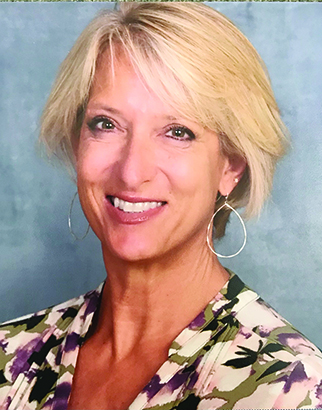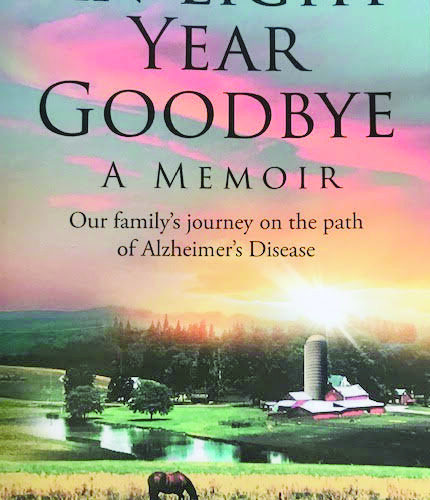Summer resident writes book to chronicle experiences, help others going through the same thing
By DAVID NAHAN/Sentinel staff

OCEAN CITY – Maryanne V. Scott felt she had nowhere to turn as she supported her father through eight years of his deteriorating health caused by Alzheimer’s disease.
Samuel Valenti was a strong, intelligent man and it was heart-wrenching watching him fade away right in front of her. Scott almost wished he had a physical ailment instead of Alzheimer’s “because the essence of the person isn’t there any more. It wasn’t even him any more.
“When you’re caring for a person who is just a shadow of himself it’s just awful,” she said. “You can’t hold a conversation. That’s why I called it ‘An Eight Year Goodbye’ because you are literally saying goodbye to this person every day because every day they’re leaving you a little bit more.”
“An Eight Year Goodbye” is the title of the book Scott wrote to document her journey helping her parent through a devastating disease. She hopes that anyone who reads the book will be able to recognize themselves in the struggle, to realize they are not alone, because that is how Scott felt.
“If it helps one person, I’ll be happy,” she said of the book.
Her father was diagnosed with Alzheimer’s disease in 2005. She spent a little more than eight years watching his decline. During that time, she didn’t have any peers her age who were going through the same thing because her father was older, so there wasn’t anyone outside her family to ask about it, and the reading materials were not helpful.
“I really had nobody to talk to about it so I was trying to find any book I could find on it,” she said. All the books she found were about the clinical aspects of the disease, what was happening to the brain. She needed a different type of support.
“I needed someone to talk about it from the emotional point of view, the guilt that you feel. The impatience that you feel when the person is repeating themselves over and over again. How to handle some of those situations that I had no clue how to handle. I kind of had to learn it as I went along,” she said.
It started out mild, with her father repeating himself, forgetting things, “not quite understanding what I was telling him,” she said. “As it went on, the hygiene started to go, the paranoia started setting in. He had every symptom of the disease you can imagine.”
And she had to realize that at the end stages, Alzheimer’s victims die because “they forget how to swallow.”
“The whole time he was going through it, I wondered is this the disease you die from? I didn’t understand anything about it. The doctor explained to me the brain forgets how to swallow. I was just horrified,” she said.
Scott doesn’t want others to go through the experience blind.
“If someone could read it and say, ‘That’s how I’m feeling. That’s what I’m going through, feeling that hopelessness, I don’t know what to do, I don’t know how to help.’ I just give a few little pointers.”
As an example, she always spent time correcting her father.
“He would say, ‘Oh, what a beautiful morning.’ And it would be getting dark. I would say, ‘Dad, it’s night. It’s not morning.’ He would get very embarrassed, then I would feel guilty, and I wondered why I insisted on correcting him all the time. It’s that you’re trying to pull them back into reality.
“I learned over time you’re just supposed to go along with them because you’re not going to fix it. You have to say, ‘Yes, it is a beautiful morning.’”
Scott said during the last six months of her father’s life, she was “living in a daze. You kind of go on autopilot. I wasn’t aware of some of the things he was doing.” After he died in 2014, she started writing down her experiences.
She wrote about the more severe manifestations of the disease, and then also started writing down other symptoms as his condition progressed. While she was doing that, she began to wonder if putting that together in a book could help other people facing the same situation with a loved one.
As another example, she said the last month or two before he died, he started seeing people who died before him. “One day he said, ‘Look, there’s your mom.’ She had died several years before.”
As a few years passed and some of her friends began experiencing Alzheimer’s because of a parent, one of them told her, ‘You know, you’re a wealth of knowledge about this. You should write a book.’”
Scott said she isn’t a writer and doesn’t know if readers will find her book a great work of literature, “but it’s a nice story and it comes from the heart.
“It lets you see this great guy, who was such an amazing man. He didn’t even graduate high school because his father died and he had to quit school to help his mom take care of the family farm, but he was able to do so many things,” she said. “But to see him at the end, he couldn’t even tie his shoes. He didn’t know how to put his seatbelt on. To see this man who could do so much deteriorate to where he could barely do anything, it’s such a horrible thing.”
The story isn’t just about the down notes.
“There is a lot of sadness, but there are some funny stories in there,” she said. “I wrote a chapter called, ‘If you don’t laugh, you’ll cry,’ because my brother and I had to laugh at some of the things he did because if not we would have been crying all the time. You do have to find the humor in it when he tells you one day that there’s an airplane following him and the president sent the airplane after him.”
The book chronicles the different stages of the disease and the beginning just tells about her father, “how he grew up on the farm, served in World War II, when he met my mother. Our family life growing up.”
Then it goes into the glimpses of what they were seeing, wondering what he was doing and why. It involved getting him tested and realizing that it’s much more serous than him not paying attention or asking the same question over and over again. It includes having caregivers help, trying to keep him in his home for as long as they could, wondering whether she and her brother should quit their jobs to take care of him – a 24/7 duty. They had to make the tough decisions.
She also writes about reaching out to the Alzheimer’s Association, the resources it has and the help it can provide, and learning about symptoms such as “sundowning,” which is how some symptoms gets worse when the sun goes down.
Importantly, she said, was learning how to take care of herself as a caregiver “because I experienced every symptom of caregiver burnout.” She learned she had to seek help and have a support system.
Scott is a summer resident of Ocean City. Her family has had a home on West Avenue for about 25 years. She lives in Doylestown, Pa. She said she works at a school and when school lets out, she is in Ocean City from then until school resumes in September. “I love it there,” she said. They visit all the time and she and her husband are contemplating moving to the resort full-time after retirement.
The book is on Amazon.com, Barnesandnoble.com, Googleplay, iTunes, and should be available soon at Sun Rose Words and Music on Asbury Avenue in Ocean City.



